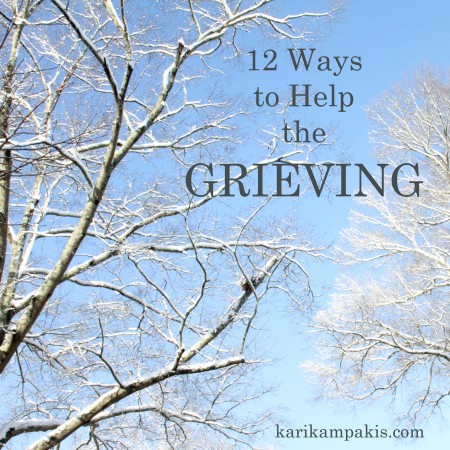How to Help the Grieving

In February 2014, a dear friend of mine lost her husband in a tragic accident. As multitudes of people flocked to lift her family up and help in their time of need, I reached out to a mom who had lost her spouse years ago to see if she had advice on how to help a grieving friend.
It turned out she did. She had excellent advice, in fact, and because grief is relevant to all of our lives, I’d like to share the wisdom that she’s agreed to let me pass on.
Here is some food for thought, things to keep in mind when you want to help a friend who has lost her loved one:
1. Remember, you can’t fix things. When tragedy strikes, we all want to help. We rally around our friend and want to do something. Although there are things we can do, we can’t fix what has permanently changed in her life.
When God says He is the “God of all comfort,” this is a deep, rich truth. All true and healing comfort comes from Him. While God may use you to administer some of His comfort, it originates in Him.
The best thing you can do for a grieving friend is study your Bible and get to know God better. As you minister love and grieve with your friend, point her to our Heavenly Father.
2. Don’t judge. There is no wrong way to grieve a sudden loss. Whatever keeps your friend breathing is fine. A grieving friend can’t hurt your feelings either, because it’s your gift to her to overlook anything she might say or do, or not say or do. The period after a death is not about your friendship; it’s about letting your friend circle the wagons around her family and try to survive. It’s overwhelming, so let her focus her energy on keeping herself and her children upright.
3. Have compassion and be very sensitive, but don’t pity a friend who is mourning. There is a difference between pity and compassion; while pity is discouraging, compassion instills courage.
Pity says, “Oh, you poor thing. This is so terrible for you and your sweet children. What can I do for you?”
Compassion says, “I’m so sorry this has happened. I can’t imagine what you’re going through. I’m right here with you, every step of the way.”
Compassion operates from the truth that your friend can do all things through Christ who strengthens her. She isn’t a victim of the randomness of life, but rather a beloved child of the living God, who has tremendous tenderness toward the grieving and will never leave or forsake them.
4. When you cry for your friend, do it at home. Don’t burden her with your tears and anguish. Don’t make her comfort you. It’s okay to shed some tears when she’s crying, but leave the sobbing come a-parts to her.
5. As time goes on, let your friend tell you how badly it hurts. Don’t argue or tell her that she has so much to be grateful for when all she can feel is her loss. Certainly she’ll need to count her blessings and practice gratitude, but Scripture is full of moments where people (David, Job, Jeremiah, Jesus) cry out and tell God how hard life is. God does not correct them; He only reminds them that He is present, He is sovereign, and He is love.
Offer a safe place where your friend can share her rawest emotions and thoughts. It’s hard for a loving person to listen to someone else’s grief without trying to fix it or make it feel better, but the road to healing is through the pain, not around it.
6. When you offer help, make it specific. Don’t say “call me if you need anything.” Say, “We’d love to have you and the kids to grill out Saturday night.”
7. Be respectful of your friend’s need to handle the loss her way. Your friend is walking in uncharted territory, and you don’t know how she feels. Offering uninformed or unsolicited advice can be hurtful. It’s more helpful for her to hear statements like, “I can’t imagine what you are going through, but I can see that God is with you.”
8. Extend invitations, especially on weekends and holidays, because they can be brutal. It’s fine if your friend says no, but keep inviting her. Do this for years to come because it is an ongoing need.
9. Show your friend how you remember her loved one. Text a picture when you see something that reminds you of them (i.e. their favorite strawberry cake) or share a thought that comes to mind. It helps your friend to know how their loved one lives on in your memories, too.
10. As time goes on, let your friend be a friend to you, too. There will be a day when she feels the need to give back. Don’t treat her as if she’s made of glass and can’t handle being a friend. It’s healing for her to help you.
11. Remember that grieving is a long, slow process. Life will never be “normal” again. There is a new “normal,” and over time it will be good. But just because your friend is getting dressed in the morning, going to exercise, and shopping for softball cleats doesn’t mean she is “over it” or “moving on.”
Be patient as your friend re-learns how to live life. Remember that the loss will hit her over and over, often in unexpected moments. Grief can be blindsiding, and when it is, she needs to feel the loss of that moment.
12. A grieving person needs her friends desperately. She needs the comfort of her Savior even more.
There’s so much more that can be written on the subject of helping a grieving friend, but this list is a starting point. Above all, approach her from a place of love and pray for guidance. Listen for God’s voice, and once you receive direction, ask God to use you as a vessel of his love, grace, mercy, and compassion.
Also, if you’d like a book for your grieving friend, look into A Grace Disguised. Written by Jerry Sittser, who lost his mother, wife, and young daughter in a car accident, this book has brought great comfort and healing to thousands over the years and comes highly recommended by multiple friends of mine who have lost loved ones. Jerry’s words are deep, insightful, and full of hope for the future.
******************************************************************************************************************************
Thanks for reading this article today. If you found the message helpful, please share it through social media.
I’m grateful for my readers and would love to connect. You can subscribe to my blog, join my Facebook community, or find me on Instagram, Twitter, or Pinterest.
Also, I’ve written two books for teen & tween girls designed to empower them through faith. The newest one, Liked, is getting a fantastic response as a unique resource for girls of the digital age, and along with the bestselling 10 Ultimate Truths Girls Should Know, it’s being used widely across the U.S. for small group studies.
Have a great day, and thanks again for stopping by!
Posted by Kari on July 9, 2014








0 Comments